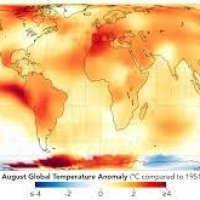Record-breaking Temperature in 2023 Amid Climate Change That Is Increasing
Record-breaking Temperature in 2023 Amid Climate Change That
Is Increasing
According to preliminary climate data, 2023 was the warmest
year on record worldwide since the start of instrumental records in 1850. This
validates scientific alerts that indicate climate
change is still accelerating and getting worse every year.
New Heat Milestones for the Year
2023 will surpass 2016 as the warmest year on record, with
average global temperatures rising 1.48°C over pre-industrial levels between
1850 and 1900, according to the EU's Copernicus Climate Change Service.
Other concerning firsts for the year included over half of
the temperature
rising above 1.5°C, as set by the Paris Agreement, and every day exceeding
the 1°C warming barrier above the mid-19th century.
Growing Risks
In 2023, the world saw more natural calamities than ever
before, such as extreme heat waves, a global drought, and wildfires that burned
26 million hectares during Canada's most devastating season.
In the meantime, the primary cause of the observed warming
last year was the record-breaking atmospheric quantities of greenhouse gases
like CO2 and methane.
Why Is It So Hot?
Although the first El Niño event in seven years began in the
middle of 2023, contributing to some of the excessive heat, scientists stress
that the primary cause is still the accumulation of pollution from burning
fossil fuels by humans.
Due to the rapid increase in radiative forcing caused by
increased greenhouse gas concentrations, which traps more solar energy, the
last eight years are the hottest on record for modern times. The trend of
rising temperatures will not stop until net world emissions are zero.
Prospective Course
With El Niño continuing, some climate scientists predict that
2024 may even surpass 2023's worrying new heat records, raising the possibility
of breaking significant global landmarks.
Within the next five years, there is now a two-thirds
likelihood that the yearly average global temperature will rise above the 1.5°C
Paris agreement, resulting in significantly worsening climate change effects.
Reversing the current direction and implementing massive
emissions reduction are still necessary to prevent this. However, when the
temperatures on land, in the sea, and in the sky continue to rise, there is
less and less hope. The record dry season of 2023 is now marked as the most
recent warning sign of unprecedented atmospheric change in human history.
